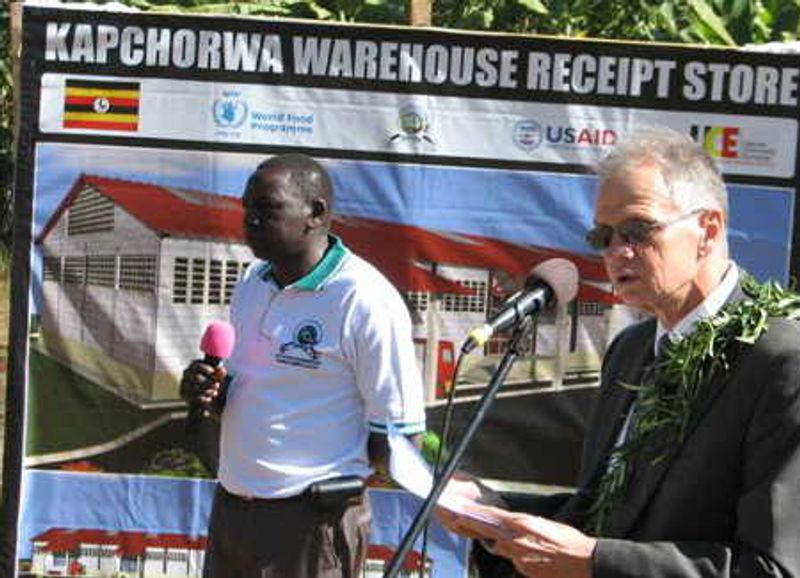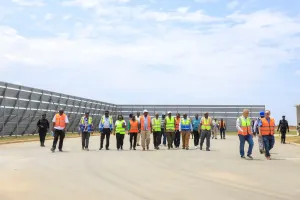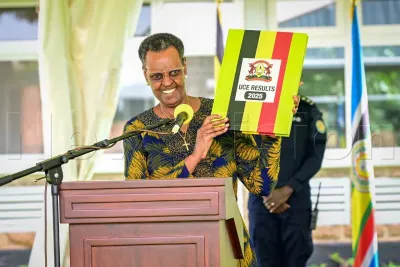

Former US ambassador Lanier handing over a warehouse built with FTF funds. Photo credit: US Mission
The Uganda government is frustrating the fight against poverty by failing to adopt progressive policies that promote agricultural innovations access to quality and affordable inputs for farmers a senior USAID official has said.
Andrew McKim, the Coordinator of the Feed the Future, a US$150m programme implemented by the United States Agency for International Development (USAID), in Uganda, told The Sunrise in an exclusive interview that the government has been rather slow in addressing policy challenges affecting farmers in Uganda.
“Policies that we are thinking about are not those the US government wants but what Ugandan farmers want and are thinking about. It is what the private sector sees as critical priorities for improving the markets,”said McKim.
McKim cited four areas where government policy remains a challenge. He named counterfeit and poor quality seeds, costly fertilizers, extension services provision and agricultural trade as problematic areas.
McKim blamed the Ugandan government’s failure to crack down on counterfeit seed as a major roadblock that frustrates farmers as well as seed companies from investing in the sector.
“Seeds is one of the most important concerns for farmers.”McKim adds: “But counterfeit seed are widespread and it’s heart-breaking for a farmer to prepare his land and invest in [counterfeit] seed. Seeds are high priority for farmers and the private sector.”
Experts argue that improved seeds are a major factor influencing total agricultural output. In Uganda however, according to McKim, only 6% of farmers use improved seeds, something that ensures farmers get limited output.
A move by Ugandan scientists and ‘progressive’ farmers to adopt Genetically Modified (GM) seeds failed to sail through parliament last year, despite vigorous support from several agencies including from countries such as the United States.
McKim denied the Embassy had a position on the bill, but added the mission educated stakeholders on the facts about the subject.
McKim further pointed at the high cost of fertilisers in Uganda compared to neighbouring countries in the region, as a major roadblock to farmers.
He said: “The cost of fertilisers in Uganda is about 50% hinger than in Kenya. This is in addition to counterfeit products. Again there are some administrative procedures that are quite frustrating.”
McKim’s comments came in response to views expressed by the American Ambassador to Uganda Scott DeLisi who expressed concerns about the implementation of Feed the Future programme in Uganda.
Ambassador DeLisi said the health sector in Uganda has recorded meaningful results because of supportive government policies, something that is sorely lacking in the agricultural sector. He cited the lack of supportive policies as a challenge to the successful implementation of Feed The Future programme in Uganda.
The American government ear-marked US$ 150m for the FTF programme in Uganda over a five year period 2011 – 2016.
According to McKim, the FTF programme works through a number of local partners targeting the development of value chains in 38 districts in the country and has reached 365,000 farmers.
Working on three major cash crops of Coffee, Maize and Beans, the USAID has been providing support to farmers’ organizations through agencies such as aBi-Trust that act as link agencies.
“We work through partnerships to provide support to Ugandan institutions through training, technical assistance, and improving market access. We are interested in is making those various institutions meet the needs of their members. Within our focus districts, we reached 17% of our coffee farmers, 12% of maize and 13% of all bean farmers,” noted McKim.
The USAID official hailed as successful interventions in the value chains of the three respective crops by for example increasing the incomes of coffee farmers by up to 300%.
Implementation of the FTF programme will however stay in the 38 districts over the remaining period of the programme, according to McKim.













Sunrise Admin
Leave a Comment
Your email address will not be published.